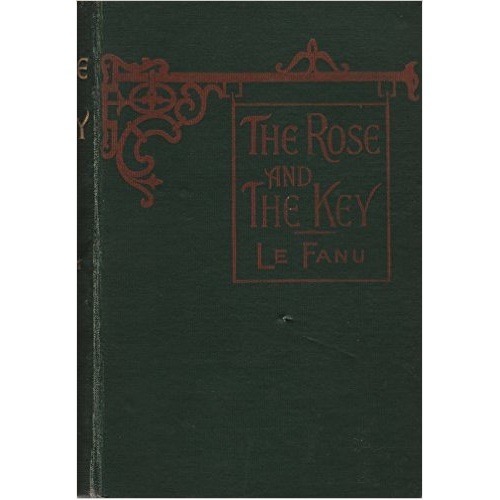
The name Joseph Sheridan Le Fanu is one that, today, hardly produces even a twinkling of recognition in the most word-worn eye. The author was, however, quite popular at the time he was most actively writing – the 3rd quarter of the 19th century – and he was, in particular, well known for his gothic romances. The genre was summed up fairly adequately by a friend of Vonnegut’s: “a girl takes a job in an old house and gets the pants scared off her” – but within that general framework there is much room for variation, as The Rose and the Key shows.
Uncle Silas is the most lauded of his books along these lines (though Carmilla gets love too) , and perhaps rightly so: of his novels I’ve read, Wylder’s Hand is entertaining but let down by unsatisfying villainy, and The Rose and the Key is, while similar to Uncle Silas in some ways, very different in tone. It is, however, a very entertaining frog-in-the-pot experience, effectively hiding the machinations and malice that mark the antagonists of gothic romances from the eye of both the reader and the main character.
In Uncle Silas, the rather clueless protagonist is almost immediately put in a strange and unnerving position, and while she takes some time to comprehend this, the reader immediately knows that so-and-so is bad news, and there is certainly this or that plot happening. This is very much not the case in The Rose and the Key, which is really, for the most part, quite pleasant both for the reader and the girl leading the story – both heiresses in these stories are called Maud, by the way; Le Fanu had a weakness for the name, it seems.
Maud (that of the book now being reviewed) is outspoken and eccentric, and her whims and soliloquies reflect more an intelligent young woman in the usual perplexities of relationships and familial strife, rather than a scared girl faced with barely hidden plots to destroy her. Yet the reader is provided ample reason to believe her the subject of such plots, not least of which being the fact that the book is a gothic romance by Joseph Sheridan Le Fanu. But there are red herrings enough, and the prime movers of the story are concealed well enough, that many will only spy the trap as it is sprung, then look backwards and curse themselves for not detecting it earlier. Genre fans will likely have suspicions, as I did, but Le Fanu plays successfully on these as well.
The negative consequence of this is that for hundreds of pages it reads not as the story of a gradual, sinister entrapment of a rich young girl, as you are nevertheless sure it must be, but is instead simply a rich young girl coping with a reclusive and unusual lifestyle. Not everyone is willing to take that ride all the way to the end of the line, needless to say, for which reason it’s hard to recommend The Rose and the Key to anyone new to the genre. Uncle Silas is a better introduction to this, or even a novella like Carmilla or Poe’s Ligeia.
As usual, Le Fanu is on point when it comes to prose: dialogue is sharp and interesting, while descriptions of place are generously provided with imagery and allusions – like this passage, for instance, which seems itself to toll like a bell with its depiction of a churchyard at dusk, and begs to be spoken aloud in its languorous rhythm:
“The sun is drawing towards the horizon ; it is six o’clock. The tombstones cast shadows eastward on the grass, and the people, as they troop upward toward the porch, throw their moving shadows likewise along the green mantle of the dead, and the grey churchyard wall catches them perpendicularly, by the heads and shoulders, and exhibits in that yellow light the silhouettes of worthy townsmen and their wives, and sharp outlines of hats and bonnets, gliding onward, to the music of the holy bell, to hear the good old bishop preach.”
The Rose and the Key was a pleasant diversion, surprisingly well executed and with more depth of character than Le Fanu’s other books. Anyone who has enjoyed other works in this particular, and unfortunately somewhat limited, genre will appreciate it
